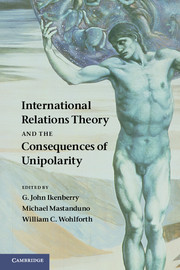Book contents
- Frontmatter
- Contents
- Figures
- Tables
- Notes on the contributors
- Notes on the editors
- 1 Introduction: unipolarity, state behavior, and systemic consequences
- 2 Unipolarity, status competition, and great power war
- 3 Legitimacy, hypocrisy, and the social structure of unipolarity: why being a unipole isn't all it's cracked up to be
- 4 Alliances in a unipolar world
- 5 System maker and privilege taker: US power and the international political economy
- 6 Free hand abroad, divide and rule at home
- 7 The liberal sources of American unipolarity
- 8 Unipolarity: a structural perspective
- 9 Unipolarity and nuclear weapons
- 10 From unipolarity to multipolarity: transition in sight?
- 11 Sell unipolarity? The future of an overvalued concept
- Index
- References
2 - Unipolarity, status competition, and great power war
Published online by Cambridge University Press: 05 June 2012
- Frontmatter
- Contents
- Figures
- Tables
- Notes on the contributors
- Notes on the editors
- 1 Introduction: unipolarity, state behavior, and systemic consequences
- 2 Unipolarity, status competition, and great power war
- 3 Legitimacy, hypocrisy, and the social structure of unipolarity: why being a unipole isn't all it's cracked up to be
- 4 Alliances in a unipolar world
- 5 System maker and privilege taker: US power and the international political economy
- 6 Free hand abroad, divide and rule at home
- 7 The liberal sources of American unipolarity
- 8 Unipolarity: a structural perspective
- 9 Unipolarity and nuclear weapons
- 10 From unipolarity to multipolarity: transition in sight?
- 11 Sell unipolarity? The future of an overvalued concept
- Index
- References
Summary
Does unipolarity promote peace among major powers? Would the return of multipolarity increase the prospects for war? Although unipolarity has been marked by very low levels of militarized competition among major powers, many scholars doubt whether the association is causal. Mainstream theories of war long ago abandoned the notion of any simple relationship between polarity and war, positing that conflict emerges from a complex interaction between power and dissatisfaction with the status quo. “While parity defines the structural conditions where war is most likely,” one team of prominent power transition theorists notes, “the motivation driving decisions for war is relative satisfaction with the global or regional hierarchy.” High levels of dissatisfaction may prompt states to take on vastly superior rivals. To explain the low levels of conflict since 1991, therefore, scholars must look beyond the distribution of capabilities to account for the absence of such dissatisfaction.
To most observers, moreover, satisfaction and dissatisfaction with the status quo among today's great powers appear to be driven by factors having little or nothing to do with the system's polarity. “For most scholars,” writes Robert Jervis, “the fundamental cause of war is international anarchy, compounded by the security dilemma. These forces press hardest on the leading powers because while they may be able to guarantee the security of others, no one can provide this escape from the state of nature for them.” But for today's leading powers anarchy-induced security problems appear to be ameliorated by nuclear deterrence, the spread of democracy, the declining benefits of conquest, and changing collective ideas, among other factors. In combination, these factors appear to moderate insecurity and resulting clashes over the status quo, which most scholars believe drive states to war. Mainstream theories of war thus seem irrelevant to what Jervis terms an “era of leading power peace.”
- Type
- Chapter
- Information
- Publisher: Cambridge University PressPrint publication year: 2011
References
- 1
- Cited by



